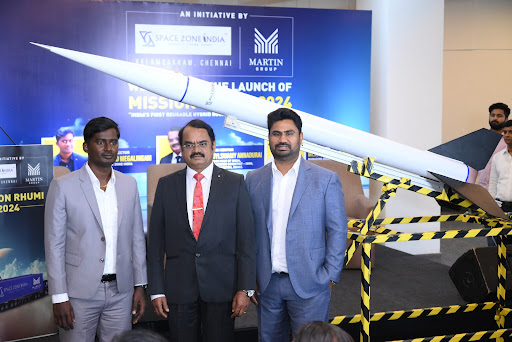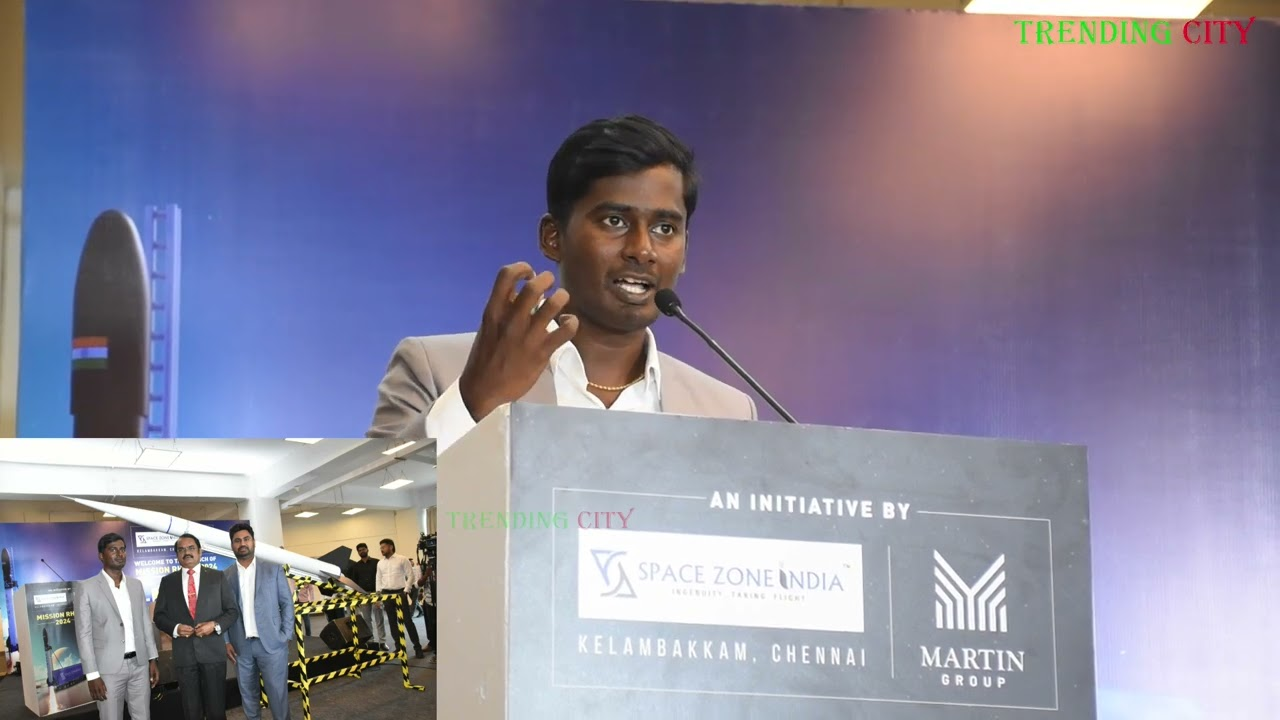Anand Megalingam’s inspiring journey from failure to becoming the man behind India’s first reusable hybrid rocket serves as a testament to the power of perseverance, passion, and the determination to rise against all odds.
Born to a truck driver and a homemaker, Anand’s story is a beacon of hope for anyone from humble beginnings aspiring to make a mark in the world of space technology. His launch of the reusable hybrid rocket, RHUMI, in August 2024, has paved the way for innovations in space tech and highlighted India’s growing capabilities in aerospace.
A Humble Beginning: From Failure to Opportunity
Anand Megalingam’s path to success was far from easy. Coming from a modest background in Chennai, he faced academic challenges that initially set him back. He failed all subjects in his first semester while pursuing a degree in electrical and electronic engineering, which led many to doubt his potential.
However, Anand’s story wasn’t one of giving up. Instead of being discouraged by this failure, he turned to his strength in sports, which helped him secure admission to a private college. It was there that Anand shifted his focus to aeronautical engineering, a decision that changed the course of his life.
Read : SpaceX Catches Starship Rocket Booster with Robotic Arms: Watch
Aeronautical engineering opened up a new world for Anand Megalingam. The subject captured his imagination and sparked a passion that would drive him forward.
He soon excelled in the field, participating in hundreds of competitions, winning prizes, and gaining recognition for his innovative ideas. This success fueled his ambition to go beyond just academic accolades and turn his knowledge into tangible achievements.
Read : People in the Area Were Seen Scrambling for Safety as Debris Fell from the Sky in China
The struggles his father faced as a truck driver to provide for the family remained deeply ingrained in Anand’s memory. As a tribute to his father’s dedication and sacrifice, Anand would later make his father a 50% stakeholder in the company he founded, Space Zone India.
This decision symbolized the familial bond that helped shape his journey and the recognition that his father’s hard work played a crucial role in his success.
The Birth of Space Zone India and the Vision for RHUMI
With his expertise and growing experience in aeronautics, Anand Megalingam decided to create a platform where young students could immerse themselves in the world of space technology.
He launched Space Zone India, a startup based in Tamil Nadu, with a dual mission: to manufacture eco-friendly rockets and to nurture a new generation of Indian space enthusiasts. Space Zone India quickly garnered attention for its focus on sustainability and innovation in aerospace technology, securing support from key players like the Indian Government, ISRO, and various CSR organizations.
Anand’s vision for Space Zone India went beyond just making rockets. He wanted to create opportunities for young Indians to engage with space technology at an academic level, helping them discover their potential in an industry that is often seen as inaccessible.
His initiative aimed to bridge the gap between academic theory and practical application, encouraging students to explore careers in science, technology, engineering, and mathematics (STEM).

The turning point for Anand Megalingam and his startup came with the development of RHUMI, India’s first reusable hybrid rocket using a mobile launch pad. The project was ambitious and filled with challenges from the start. The goal of RHUMI was to create a rocket capable of gathering critical atmospheric data, which would contribute to the study of climate change.
Anand Megalingam and his team recognized the important role space technology could play in addressing global environmental challenges, and RHUMI became their answer to how they could make a meaningful impact.
Challenges and Success: The Journey to the RHUMI Launch
The journey to RHUMI’s launch wasn’t smooth. Anand Megalingam and his team began working on the project in January 2023, facing tight deadlines and limited funding. Despite these constraints, the team’s commitment to their vision remained steadfast.
The first prototypes of RHUMI didn’t perform as expected, but instead of being discouraged, the team used these setbacks as learning opportunities. They conducted detailed analyses of the failures, redesigning the rocket’s form and functionality to improve its performance.
The final version of the rocket took six weeks to complete, while the mobile component required an additional six months of manufacturing. This meticulous attention to detail was necessary to ensure the success of the project, as the stakes were high. RHUMI wasn’t just a technological achievement for Anand Megalingam; it was a symbol of his team’s dedication and resilience.
Throughout the development process, Space Zone India had to navigate numerous regulatory hurdles, securing permissions from various governmental bodies, including the Director General of Civil Aviation (DGCA) in Delhi, the Air Force, and the Airport Authority of India.
Anand Megalingam revealed in an interview that all the necessary approvals were obtained just one week before the scheduled launch date of August 24, 2024. This last-minute clearance added to the tension surrounding the launch, but it also highlighted the determination and thoroughness of the team.
On the day of the launch, the coastal village of Thiruvadanthai in Tamil Nadu became the site of a historic event. Thousands of students, government officials, and state bodies gathered to witness the launch of RHUMI.
As the rocket prepared for takeoff, Anand Megalingam, who was in charge of the entire process, experienced a tense moment when there was a 4-second delay in ignition.
Those four seconds felt like an eternity to him, as the success of the entire mission, his team’s hard work, and his own personal journey flashed before his eyes. But all the careful planning and triple-checking paid off—RHUMI launched smoothly, marking a milestone in India’s space exploration efforts.

RHUMI’s successful flight was not only a victory for Space Zone India but also a significant step forward in space technology. The rocket carried three Cube satellites and 50 PICO satellites, each equipped to gather data on various atmospheric factors such as cosmic radiation, UV radiation, air quality, and ozone levels.
This data is crucial for understanding environmental dynamics and will play a key role in the ongoing fight against climate change.
The success of RHUMI has positioned Anand Megalingam and Space Zone India as key players in the future of India’s space exploration efforts. With a startup now valued at Rs 800 crore, and the support of both governmental and private organizations, Anand’s journey is far from over.
His focus on eco-friendly rockets, along with his commitment to fostering the next generation of space scientists, aligns with India’s growing interest in sustainable space technology.
The impact of RHUMI and Space Zone India is not limited to the scientific community. The launch has inspired countless young students across India, showing them that it is possible to achieve great things regardless of one’s background or circumstances.
Anand Megalingam’s personal story of overcoming failure, embracing new opportunities, and turning challenges into successes resonates deeply with those who dream of making a difference in the world.
As Anand Megalingam looks ahead, he remains committed to advancing space technology while addressing critical global issues like climate change. His journey from the son of a truck driver to a trailblazer in India’s space industry serves as a powerful reminder that determination, passion, and hard work can propel anyone toward greatness.

